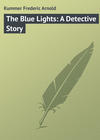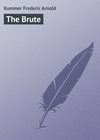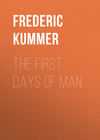Loe raamatut: «The Green God», lehekülg 8
CHAPTER XI
THE VENGEANCE OF BUDDHA
When Miss Temple launched her terrible and unwilling accusation against her father, and was carried unconscious from the room, I realized that I was, to all intents and purposes, a free man. Whatever the circumstantial evidence which had been so cleverly brought against me by the Scotland Yard men, I knew that it could have no weight against actual testimony to the effect that it was Major Temple, and not myself, who had, early that morning, crept out upon the roof of the porch and entered Ashton's room by way of his window. Miss Temple, it is true, had testified that the window was closed, but she could not know whether or not it was bolted, or whether Ashton had opened it later, before retiring, to secure fresh air in his room during the night. To me it seemed probable that he had. How to account for its subsequent rebolting from the inside I could not imagine, unless Major Temple had done it, unknown to me, when we first entered the room on the morning of the tragedy. I looked to see all these matters cleared up when he was placed upon the stand, and I was not surprised to see one of the officers in the court approach the figure sitting bowed and silent among the buzzing spectators and, laying a hand upon his shoulder, bend down and whisper a few low words into his unheeding ear. That Major Temple's arrest must inevitably follow his daughter's testimony was apparent to everyone. He arose and was about to accompany the officer to the dock, when there was a murmur of voices about the door, and I saw Sergeant McQuade enter with the ugly figure of Li Min beside him, followed by the interpreter, while Inspector Burns, stepping quickly to the Magistrate's desk, said a few hurried words to him in a low voice.
The Magistrate, apparently very much surprised, turned to the court-room, rapped loudly for order and motioned to the officer in charge of Major Temple to release him. Sergeant McQuade, meanwhile, with his prisoner, had advanced to the dock, and without further ceremony I saw the court attendants administer the oath, the import of this being explained to the Chinaman by the interpreter.
I learned afterward that Li Min, upon his first appearance as a witness, had been under the impression that he was being tried for his attempt to steal my satchel, and, as he did not then know that his compatriots in London had secured the emerald, feared to make disclosures regarding his attempt to secure it which would inform the police of its whereabouts. The interpreter, a Chinaman of the better class, who was in the habit of acting in this capacity for the police, had argued with him during the noon hour, had convinced him that he was not charged with any crime, that the emerald Buddha had been secured by his friends in London, and was, ere now, no doubt, on its way back to China. Under these circumstances he was at last persuaded to tell his story and, after an interminable amount of questioning, it was at last dragged from him. I have placed his testimony together into the form of a narrative, which will enable the reader to understand its purport, without being under the necessity of going through the laborious cross-questioning by the Magistrate and the interpreter which was necessary in order to drag it forth.
It seems that Li Min, a native of South China, and by religion a follower of Buddha, had associated himself with the reform movement in China, which has drawn into its ranks many of the most intelligent of the Chinese. Like many of his countrymen, he was under suspicion, and, knowing the enmity of the Dowager Empress and her advisers toward the movement, had come to Hong Kong with the intention of leaving the country. His engagement as a servant by Major Temple was for him a piece of excellent luck, as it enabled him to leave China without being under any suspicion as to his motives for doing so. It was during the voyage to England, and his subsequent stay in Major Temple's service, that he first learned the story of the emerald Buddha. Piece by piece he gathered the details of the story, and from frequent conversations between Major Temple and his daughter, which they carried on without regard for his presence, he came to know of Ashton's determination to secure the sacred relic. His religious feelings were outraged by what he heard, and he promptly communicated the whole matter by letter to a Buddhist priest in Hong Kong, with the suggestion that he send word to the followers of Buddha in Ping Yang. This was done, but much time had elapsed, and, when the word at last reached Ping Yang, Ashton had already escaped with the jewel. The priest in charge of the shrine, upon receiving the information as to the stone's destination, set out at once for London with two of his followers, determined upon the recovery of the emerald at any cost. They made such speed that they got to Pekin a considerable time before Ashton arrived there, owing to his wanderings in the interior after his escape from his pursuers. They set out at once for England and arrived in London some weeks before Ashton's coming. They at once communicated not only with Li Min but with their followers in London, and a plan was worked out which would inevitably have resulted in the recovery of the jewel, had it been peaceably turned over to Major Temple as they supposed would be the case. Li Min was to notify them as soon as Ashton arrived at Major Temple's, and, after that, both he and the Major's house were to be carefully watched and the stone recovered at the first opportunity. They naturally supposed that the bargain between Major Temple and Ashton would be carried out, and the stone left in Major Temple's possession. It would then be Li Min's part to admit his confederates to the house and with their assistance steal the jewel and make away with it. When Li Min, in waiting on the table that night, first saw the emerald Buddha his impulse was to seize it at once and remove it from the impious hands of the foreign devils. This he was of course unable to do. He then planned to go into Exeter that night and send word to his confederates in London, as arranged, but, owing to the furious storm, and the impossibility of accomplishing anything at that late hour of the night, he determined to wait until early the next morning. He overheard the quarrel between Ashton and Major Temple after dinner, and the fear that the former might leave the house the next day, taking the jewel with him, had left him awake throughout the night, devising plans for the coming day. He arose about half-past four o'clock, but, as it was still raining heavily, he crept silently through the hallway of the west wing to Ashton's door, hoping to find it unfastened. Upon finding it bolted, he had gone to the window at the end of the hall, unfastened it, raised the sash and looked out. It was still raining, although not so heavily, and the light of early dawn was beginning to show in the sky. He made a quick decision to climb out upon the roof, enter Ashton's room by means of the window, secure the emerald and make his way as quickly as possible to the town, where he could place the jewel in safe hands. But, fearing lest, in the early morning light, he might be recognized by some chance early riser among the stablemen or gardeners, he descended swiftly to the main hall, threw on a long tan rain-coat and tweed cap belonging to Major Temple and, so disguised, returned once more to the upper floor and thence by way of the window to the porch roof. He was making his way quietly along to the window of Mr. Ashton's room when seen by Miss Temple, but he was so absorbed in his work that he did not observe her. Arriving at Mr. Ashton's window, he had tried it, only to find it bolted on the inside. The increasing light showed him dimly the interior of the room, with Ashton lying asleep in the bed. In trying to force the window he had cut his hand badly upon a projecting nail or bit of glass, but in his excitement he failed to realize it, and had rested his palm, covered with blood upon the window sill, his fingers pointing inward. His efforts to open the window had also resulted in some noise, which awoke the sleeping man within. What followed I will try to tell in Li Min's own words as rendered into English by the interpreter. "I saw the man (Mr. Ashton) rolling about in his bed. He seemed to be suffering, and I heard him groan and once cry out in his sleep. I pushed the window again, and it made a loud noise. The man jumped up quickly, and started toward the window. His face was white, and terrible. And, as he jumped from the bed, the hand of Buddha, the mighty, the wonderful one, who knows all things, smote him like a flash of fire. He fell upon the floor, uttering a loud cry. I was frightened, and ran along the roof and climbed into the house through the hall window. I heard sounds of someone moving about in the room of the young man (Mr. Morgan). I closed the window, but forgot to bolt it in my hurry. I ran quickly along the hall and went down the stairs. I put the coat and cap in the closet in the hall, where I had found them, and went out through the servant's entrance. I walked into Exeter and sent word to my brothers in London that the sacred relic had come. Then I had some breakfast and came back. Afterward I learned that the jewel was gone. I did not know whether The Great Buddha had taken it away or not. I tried to get into the room, but it was always locked. At last the dead man was taken away and I was sent to fix the room. I searched everywhere – under the carpets, behind the pictures, in the mattress of the bed – but I could not find the stone. At last the young man (Mr. Morgan) came into the room suddenly, and I watched him. He, too, I knew, was seeking for the jewel. After a time, he took the piece of soap and went away. I was a fool – I had not thought of the soap, which lay there in front of my eyes. It was the only thing I had not searched. I knew that, if Buddha had not taken away the stone, it must be concealed there. I watched the young man. I saw him put it in his bag. I went downstairs, and, after a while, when the satchel was left unguarded for a moment, I took it. The young man and the officer were outside and stopped me. When I was taken into the jail at Exeter, my friend, Chuen Moy came to see me. I told him through the bars what had happened. I did not know whether the young man would keep the stone or give it to the officer. I told Chuen Moy that they were both going to London in the afternoon. I told Chuen Moy to go to London and to inform our brothers that they might get the stone. I have done nothing wrong. The man who died had offended the great Buddha. He committed a sacrilege in the shrine and he deserved to die. The mighty hand of the all-powerful one was stretched out, and he fell dead. I myself have seen the miracle. It is the vengeance of Buddha."
I do not know what the effect of this weird story was upon the others in the court-room, but to me it rang with all the accents of sincerity and truth. Not that I believed in the vengeance of Buddha, although even that I was not in the face of the evidence prepared to deny, but the actual events of his story, as he related them, explained everything, and nothing. There were no clues which had not been unraveled and made clear, yet we were as far from the solution of the mystery as ever. My heart gave a great leap of joy when I heard the Chinaman's simple, sincere confession, and knew that, because of his disguise, his tan coat and cap, Muriel had been mistaken in supposing the figure on the roof to have been her father. For I knew that this terrible thing about her father, which she so firmly believed, and which she had for days kept locked in the recesses of her heart, must have almost broken it during those many hours of uncertainty and fear. Yet for my sake, she had told the terrible truth, as she believed it, and to save me she had gone all the way to London, to ask my advice as to the proper course for her to pursue. I realized what it must have meant to her to launch that fearful accusation against her own father and I began to hope that she might have for me a feeling not dissimilar to that which I so strongly felt for her.
There was some confusion in the court-room when Li Min finished his story, several of the spectators began to laugh at what they considered a remarkably ingenious, yet ridiculous, defense on the Chinaman's part. As they glanced at the Magistrate, however, they saw nothing approaching amusement upon his grim face. On the contrary it was very evident, when Li Min had been taken back to his cell, that he not only believed the Chinaman's story, but had been very deeply impressed by it.
Major Temple was put upon the stand again, but his examination resulted only in a repetition of his former statements and a forcible denial that he had left his room from the moment he retired the evening preceding Mr. Ashton's death until he heard my cries for help the next morning. There was no evidence now to connect either Miss Temple, her father or myself with the death of the collector. Li Min had borne out my story regarding the taking of the cake of soap in every particular. I was discharged, along with Major Temple and Miss Temple, and only Li Min remained in custody. He was, of course, held upon the technical charge of assaulting McQuade and threatening him with a deadly weapon. Inspector Burns and Sergeant McQuade both signified their intention of going to London at once. The latter, however, arranged to come down to The Oaks the following day to make a final examination into the mystery. He did not believe for a moment that part of Li Min's story which referred to the sudden death of Mr. Ashton, and was already working on some theory, which he did not elaborate to me, whereby Li Min might have been able to open the window of the dead man's room, enter, commit the murder and rebolt the window behind him after he had left. If he could establish this, he felt sure that he could send Li Min to the gallows. I was requested by Major Temple, who seemed much broken in health and spirits by the events of the past few days, to accompany him and his daughter back to The Oaks, an invitation of which I was by no means slow to avail myself. The poor girl was greatly upset, and very much tired out, and we made haste to get her home as quickly as possible. I was too sick of the whole matter of Mr. Ashton's death to discuss it, although the Major broached the subject several times on our way back. I wanted to get Miss Temple home, where I hoped for an opportunity to have a talk with her, and to show in some way my appreciation of her efforts in my behalf, and her trip to London to see me. I had wired the caretaker at my studio in town early that morning to send me down some clothes, and I hoped to be able to appear at dinner in a more presentable costume than the walking suit which I had been forced to wear, throughout my remarkable series of adventures, for the past five days.
It was close to five o'clock when we arrived home, and I found my belongings awaiting me. I was given the same room that I had previously occupied and, when I appeared at dinner at eight, I felt like a human being for the first time since I had entered Major Temple's door. I was glad to see that both the Major and his daughter were much rested, and we sat down to dinner with some show of cheerfulness, Miss Temple looking especially charming in a green silk evening gown which to my artist's eyes made her a picture that I longed to put on canvas. I told her so, and we were soon discussing pictures, and art generally, at a lively rate. Only the Major seemed depressed, and I imagine this came from his regret at the loss of the wonderful emerald Buddha. He did not refer to it in any way, but I was conscious of a far-away look in his eyes which spoke volumes. What had become of the jewel, I did not know, but I fancied that McQuade's hurried trip to London had something to do with the search his men were making for the lost underground temple of Buddha and thought it more than likely that I would know more about it when he returned the next day.
We passed an hour very pleasantly at table, and after dinner Major Temple excused himself upon the plea that he wanted to write some letters and retired to his den, while Miss Temple and I sat down before the fire in the library for our first real tête-à-tête. It had begun to rain heavily outside, with a stiff breeze blowing from the southwest, and it seemed wonderfully fine and warm and altogether delightful, sitting here in the firelight with the woman I loved beside me.
CHAPTER XII
I ASK MISS TEMPLE A QUESTION
"Miss Temple," I said, as we sat beside each other on the big leather-covered settle facing the fire, "I want to thank you with all my heart for going up to London to see me. I know why you went and can never tell you how deeply I appreciate it."
She looked at me with her bewitching smile, which somehow made me feel both delightfully happy and yet vaguely uncertain of myself. "I had to come, Mr. Morgan," she said. "As soon as I knew the police were fastening their suspicions upon you, I knew I should be obliged to tell what I had seen. Yet I felt horrified at the thought of accusing my father. I could not understand his being where I imagined I saw him. I knew his mad desire for the jewel and was filled with dismay at the thought that he would attempt to secure it by such means. Of course I had no thought then of Mr. Ashton's death. I ran to my room, threw off my wet clothes, and appeared in the hall just as your cries aroused the house. Li Min must have re-entered the house just after I retired to my room. I did not look into the hallway of the west wing. I avoided doing so purposely, as I did not wish to humiliate my father by letting him know that I had seen him on the roof. Of course I was deceived by the long coat and cap. My father is of about the same height as Li Min, and I had been so accustomed to seeing him in that particular coat and cap – he invariably wore them when walking about the grounds – that I felt no doubt whatever as to his identity. Had I found you in London, Mr. Morgan, I should have told you everything and been guided by your advice."
"I wish you had found me there," I said, "but, as it is, everything has turned out well. Only I am sorry that you should have had to undergo such a terrible experience."
"Oh, it wasn't so bad. They gave me a very comfortable room at the police station in London, and the matron was extremely kind. I might have enjoyed the experience thoroughly, had I not been so terribly worried about my father." The dark shadow which fell across her face reminded me forcibly of the suffering she had undergone. I hastened to change the subject.
"Sometime I hope to show you London and my studio under different circumstances," I said. "I've got a lot of interesting old things there that I've picked up. You must surely come."
"Oh, I should love to. And your pictures! You must show me those, too."
"I'll be glad to. We will get up a party, some time. I've lots of delightful friends among the painters and musical people. You'd like them, I know."
"It's the life I've always dreamed of," she said, her cheeks flushing with excitement. "I've been to so many places, Rome and Paris, and Vienna and Cairo, and the East, you know, but I really know very little about them. The outside I have seen, of course, but the real life – that I have missed. And now we are stuck down here, where we don't know anybody, because father fancies it is good for his health. I suppose it is, but it isn't real, joyous living. I hardly feel alive."
"But you go to London, don't you? Your father spoke of his house there."
"Oh, yes, we are there a great deal, but father's friends are mostly professors of Assyriology and Egyptology, and people of that sort, and they come and stay for hours and talk about scarabs and hieroglyphics and mummies, and all that sort of thing. Sometimes I feel almost as though I were about to become a mummy myself."
She certainly did not look it, with her wonderful color, heightened by the firelight and her large and brilliant eyes. I could not help looking deep into them as I replied.
"We must prevent that, at all costs. Let me show you what it is to really live."
"Isn't that rather a large order? And we have known each other for so short a time, too." She laughed nervously, but did not seem displeased at my remark.
"I think the experiences of the past week have caused us to know each other very well," I said, gravely, "and I hope you may think as much of the friendship which has come to us as I do."
"Are we then really friends?" she said slowly. "I never had a man friend – nor very many of any sort, I fear. We have always moved about so much from place to place."
I regretted my choice of words. I could readily believe that she would not find it easy to have a man friend, for he would at once proceed to fall head over heels in love with her, as I had done. "Perhaps not friends," I said, and, as I did so, I placed my hand over hers, which lay beside me upon the leather seat of the settle. "At least not friends only. I suppose, Miss Temple, that you will be very much surprised, when I tell you that I have never thought of you in that way. I have always dreamed, all my life, of a woman like you, who would be close beside me, and share all my hopes and dreams, and be the cause of them all as well, and be glad of my successes and not think the less of me because of my failures. But a woman to be all that must be more than a man's friend, Miss Temple – she must be his wife."
The color flooded her cheeks as I said this, but she did not draw away her hand. "A woman would have to be very greatly loved by a man, and love him very greatly in return, to be all that to him," she said.
"I can only speak for myself, Miss Temple – Muriel. I love you very greatly, so much indeed, that I am telling you of it now – when I have the opportunity – instead of waiting, as no doubt you think I should. But, were I to wait, I do not know what trick of fate might intervene to prevent me. Your father might suddenly be seized with the idea of going to India, or Japan, or somewhere else, and I should be unable to tell you what has been singing in my heart ever since the first moment I saw you. We have passed through much trouble, you and I, and that has brought us closer to each other than years of formal acquaintanceship might ever have done. I want you – I need you – I love you, and I shall always love you." I drew her to me, unresisting. "Do you love me, dear?" I said, and, when she put her arms about my neck and her head upon my breast I knew what her answer was, and that I had found my heart's desire.
It must have been half an hour later when Major Temple burst into the library, in a great state of excitement. We heard him coming along the hall, and I had made up my mind to ask his consent to our marriage as soon as he came in. I failed to do so, because he seemed much excited, and asked us at once if we had seen anything of Boris, his favorite mastiff. He had missed the dog that morning, before setting out for Exeter he said, but his mind was so troubled by the prospect of the hearing, and his daughter's arrest, that he gave the matter but scant thought. He had suddenly realized, a few moments ago, while writing some letters in his study, that the dog was not in his favorite place upon the hearthrug and that in fact he had not seen him since his return from Exeter. He made inquiries at once, but none of the servants had seen the dog since the day before. I remembered at once the howling that I had heard during the night and spoke of it. The Major thought for a moment, then raised his head with a sudden look of comprehension. "Don't you remember, Mr. Morgan, that Boris was with us when we made our examination of the green room last night? I do not recollect seeing him after that. We all left the room very hurriedly, you will remember, having just learned that my daughter could not be found. The poor fellow has no doubt been locked in there ever since, and it was his howls that you heard. Wait until I see if I can find another key – there are two about the house somewhere. Sergeant McQuade has the one usually left in the door."
He disappeared for a few moments, then returned with several keys upon a wire ring. "One of these will open it, I think," he said, and lead the way to the green room, Muriel and I following him. "Poor dog," he said as we hastily ascended the stairs, "he must be dying for food, or a drink of water."
Upon our arrival at the door, Major Temple tried several of the keys before finding one that would open it. At last the lock turned, however, and he attempted to push open the door. It refused to open, and felt, he said, as though some heavy object had been placed against it, upon the inside of the room. I went to his assistance and by pushing with our united strength forced the door inward sufficiently to allow us to enter. The Major took a candle from the room occupied by myself, across the hall, and we squeezed our way into the room with some difficulty, Muriel remaining outside. What was our astonishment to see lying upon the floor, his head close to the door, as though struck down in an effort to escape, the Major's mastiff, Boris, stone dead, his eyes wide open and staring, his mouth distended and still covered with foam, his face wearing an expression of intense fear. It was a horrible sight, and we looked at each other in alarm. "My God," said the Major – "this room is accursed. Let us go." He started for the door.
"Shall I come in?" we heard Muriel asking from the hall without.
"No – no!" the Major commanded. "We will be with you in a moment." He motioned to me to go ahead, and he followed me and closed the door.
"What is the matter?" asked his daughter as she saw our startled faces. "Isn't Boris there?"
"Yes, he is there." The Major's tone was grave and solemn. "He is there, Muriel, and he is dead. I do not know what is the secret of that room, but I shall never enter it again." He turned from us, and lead the way down the hall.
"Dead!" said Muriel, turning to me. "Is it really true?"
I assured her that it was.
She glanced at me with a scared sort of a look. "Do you think," she said, slowly, "that Li Min's story of the vengeance of Buddha could really be true, after all?"
"No, I do not," I said, though I was not so absolutely sure as I pretended to be. "It is hardly likely that Buddha would turn his vengeance upon an inoffensive dog, who had certainly done nothing to incur it. It is a curious and unfortunate coincidence, that is all. The dog has no doubt died of fright, caused by his unusual situation, coupled perhaps with lack of food, water and air. Or he may have dashed himself against the door in his struggles and died of apoplexy. I've frequently heard of dogs dying from some such cause, especially old ones. How old was Boris?"
"About four years," said Muriel, and I knew from the way in which she spoke that she did not believe my explanation of the affair in the least.
When we reached the floor below, the Major directed Gibson and one of the other servants to remove the dog's body from the room, and we all retired to the library, where we discussed the matter for a long time. Major Temple, on sober thought, was inclined to agree with my view of the matter, but in spite of our attempts to regard the event in a common-sense light, we could not shake off a mysterious feeling of dread at the thought of these two creatures, a man and a dog having so inexplicably come to their ends in this room. In Ashton's case, at least, there was a tangible enough evidence of the cause of death, but in the case of Boris there was none. Major Temple stepped out and examined the dog's body when the men brought it down from above, and upon his return reported that there was no wound or mark of any sort upon the animal that could account for its death.
Miss Temple essayed a few airs upon the piano, but our thoughts were not attuned to music, and presently, as it was close to eleven o'clock, she said good-night to us both and left us. As she passed me on her way from the room, she leaned over and kissed me upon the forehead, and I turned to find the Major staring at me in perplexity. Poor man, so many strange things had happened during the course of this eventful day that I fear he would not have been greatly surprised had I suddenly stood upon my head and attempted to recite the Jabberwock backward. I at once told him of my love for Muriel, and of her feelings toward me, and asked his consent to our marriage. "It is a bit sudden, I'll admit, Sir," I concluded, "but none the less real and true for all that."
"But, my dear Sir," gasped the Major, evidently very much taken aback by my flow of words, and my earnest and somewhat excited manner, "I hardly know you. How can you expect me to reply to such a question, to give my consent to your marriage with my daughter, when I know absolutely nothing of your position, your prospects, or your income?"
I expected his objections and answered them at once. "You are quite right, Sir, of course," I answered. "As for my income, I am making close to a thousand pounds a year from my profession, which, as you may know, is that of an illustrator for books and for the magazines. In addition to that, I have an income from my father's estate of 800 pounds a year. At my mother's death I shall have as much more. My father was Edward Morgan, of whom you may perhaps have heard. He was a well-known civil engineer, and railway constructor, and distinguished himself in India, in the construction of the great sea-wall at Calcutta. My mother is still living, and I know she would be most happy to welcome Muriel as a daughter, for I have no brothers or sisters, and she is very lonely."















